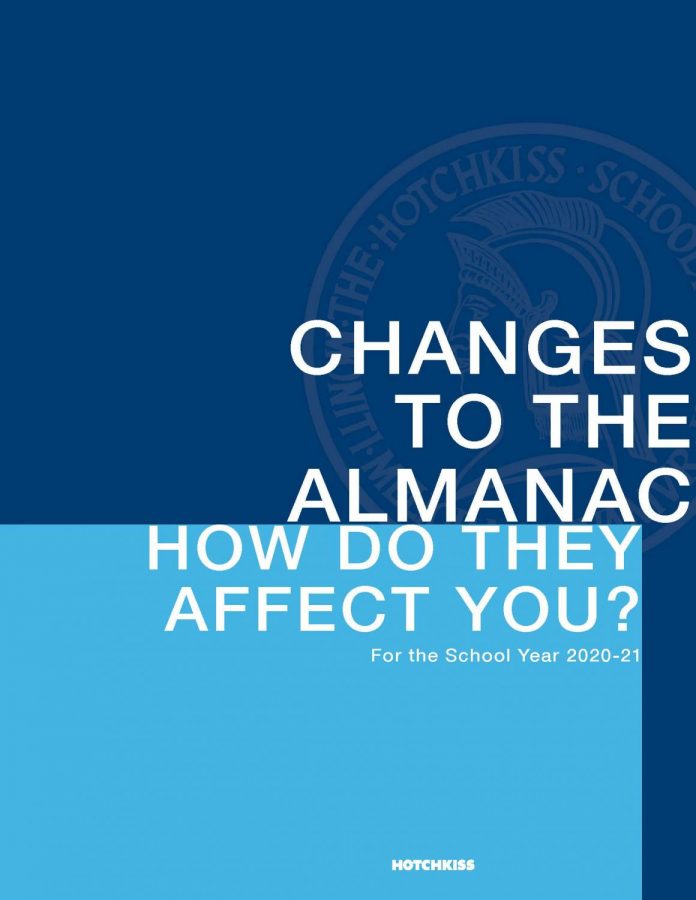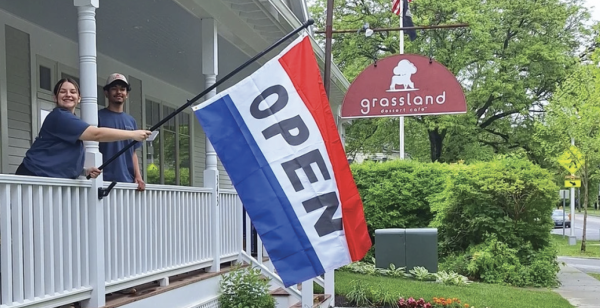2020-21 Year Brings Changes to the Almanac
Several changes were made to the 2020-21 Almanac.
Administrators worked together throughout the summer reviewing, amending, and editing the Almanac for the most up-to-date 2020-2021 version. A list of all changes made is included at the end of this article.
Academic life
The Almanac now specifies that honors and AP classes may assign up to one hour of outside-of-class work, and standard, non-honors classes may assign up to 45 minutes. Students enrolled in an honors/AP course may now choose whether or not to sit for the corresponding AP exam, and those who choose not to sit for an AP exam “may be required by the academic department to complete a final exam or project for the course. Seniors are exempt from this requirement unless they fall below a certain grade point average as set by each department.”
The DC and Code of Conduct
The Almanac now includes a broader spectrum of more specific examples of harassment in the “Harassment and Anti-Discrimination Policy” section, such as “Hate speech and racist language” and “Malicious gossip that has the impact of demeaning or denigrating others.” Examples in the Sexual Harassment section now also include “Sexually suggestive or profane language.” Mr. Stephen McKibben, dean of community life, said, “We wanted to ensure that we were clear that the school has zero tolerance for incidents of racism, discrimination, bias, hate speech and harassment; and so we added language (pg. 56) that reflects our commitment to being an anti-racist community.”
A new “Procedures for Addressing Complaints of Unlawful Harassment and Discrimination” section has been added that outlines the procedures for reporting incidents of harassment and discrimination. Mr. Yassine Talhaoui, director of diversity and inclusion, will also make an updated Bias Incident Reporting Form available during a Diversity, Equity, and Inclusion event on September 16.
In addition to faculty, students are now also expected to abide by the Ethical Code of Conduct. Through this change, the administration hopes to hold students to a higher moral and ethical standard. Mr. McKibben said, “Our expectation is that all community members—students, faculty, and our colleagues in all departments—should live up to our ideals which include comporting themselves ethically and actively contributing to a community free of racism and bias.”
The Almanac now outlines the Disciplinary Committee (DC) process in more detail, and provides new assurance that instances of hateful behavior, egregious, violent, no-chance related behavior, and Warning or General Probation violations may all result in dismissal. The dean of community life may now discuss the results of a DC case with the community publicly if it involves integrity, values, or academic dishonesty “when appropriate for educative purposes.” In addition, even if a case does not go to the DC, the Almanac specifies that “consequences may include further conversations or the inclusion of a formal letter in the student’s file.”
Other changes
The Almanac now includes additional information about accessing counselors through the Health Center. Five therapists are available for appointments during the class day, and counselors will provide 24-hour coverage for urgent, crisis evaluations. Caroline McCann ’21, proctor in Van Santvoord dorm, said, “I think the 24/7 on-call coverage will be really important if anyone has any [urgent needs] once the health center [counseling] staff is [normally] off-duty, and I think it will help proctors and dorm faculty with how to facilitate any processes that require counselors.” This year, students can access the Health and Counseling Services through the online Health Center Portal for non-emergencies.
The dress code is also less restrictive now. Wearing athletic wear, hoodies, and sweatshirts no longer violates Academic Dress requirements. Wearing sweatpants, joggers, loungewear, athletic wear, and cut-off jean shorts no longer violates Relaxed Dress specifications.

Furthermore, Special Event Dress requirements have been suspended for the first semester. Mr. McKibben explained, “Given the necessity of physical distancing [and] that we were not going to be gathering as a community, at least not during the first semester, [there was no] point [in] asking students to be in formal dress. [As for the dress code in general,] students learn best when they are comfortable, and faculty teach best when students are dressed respectfully.”
How changes were made
The “Steering Group,” which included Mr. Craig Bradley, head of school; Dr. Merrilee Mardon, associate head of school and dean of faculty; Mr. McKibben; Mr. Richard Davis, associate dean of faculty and COVID coordinator; and other members of the administration and faculty, led the Almanac revision process.
All changes
View a folder containing this and last year’s Almanac along with a document showing changes made between the two editions. For the best viewing experience open these documents with Adobe Acrobat.





